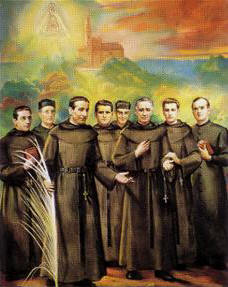Servant of God: Andrew Carrio, SJ
Born: November 30, 1876
Died: August 25, 1936
 Andrew Carrio was born in Sallent, near Barcelona. He entered the Jesuit novitiate outside Saragossa on September 10, 1891 when he was fifteen and after his noviceship, he continued with classical studies and philosophy. After one year into philosophy he was sent to Orihuela as prefect of students where he remained for five years before he went to Tortosa in 1897 to complete his philosophy course. He then went to work at the Jesuit school in Buenos Aires, Argentina for four years before returning to Spain for his theology at Tortosa. After his ordination in 1911, Fr Carrio went to Menresa for his tertianship before returning to Orihuela where he spent twenty-four years as a priest at the College of St Dominic until his martyrdom in 1936.
Andrew Carrio was born in Sallent, near Barcelona. He entered the Jesuit novitiate outside Saragossa on September 10, 1891 when he was fifteen and after his noviceship, he continued with classical studies and philosophy. After one year into philosophy he was sent to Orihuela as prefect of students where he remained for five years before he went to Tortosa in 1897 to complete his philosophy course. He then went to work at the Jesuit school in Buenos Aires, Argentina for four years before returning to Spain for his theology at Tortosa. After his ordination in 1911, Fr Carrio went to Menresa for his tertianship before returning to Orihuela where he spent twenty-four years as a priest at the College of St Dominic until his martyrdom in 1936.
Trouble began on the night of April 24, 1936 when some revolutionaries threw a bomb into the Jesuits residence near Calle Mayor. Although the bomb caused minor damage to the house, Fr Carrio took this incident as a warning. Then one night, toward the end of April, he heard some passer-bys saying: “Those Jesuits have to be killed” and when the revolutionaries held a demonstration uncomfortably close to their residence on May 1, the Jesuits realized that they were no longer safe at that address and left that same night for different parts of the city.
Fr Carrio stayed in another Jesuit house until the middle of July and when the civil war broke out, he went to live with a certain Mr Emile Salar from 23 July until August 12 and during this period, he was able to celebrate daily Mass and administer the sacraments to all who asked for them. The peace and safety he enjoyed in the Salar household came to an abrupt end on August 12 when the mayor of Orihuela issued a decree which required all religious, male and female, not born in Orihuela to leave the city within forty-eight hours. As Fr Carrio came from Sallent, in the north, he had to seek refuge in the country estate of his friend, Mr Jose Meseguer who arranged for him to stay in the property of a widow. Later, on August 21, Mr Meseguer planned to bring Fr Carrio to another refuge, an inn in Alcazares belonging to his friend. They had to be very careful as Fr Carrio had no traveling pass. However the bus driver happened to know Mr Meseguer and allowed Fr Carrio to travel on his bus. When they arrived at the inn, Mr Meseguer registered Fr Carrio as a Mr Andrews who had come to benefit from the local baths.
As Fr Carrio was intent on getting to Alicante, Mr Meseguer obtained for him the required pass on August 25 and set out with it for the inn in Alcazares early the next morning. He headed straight for the baths only to hear from the manager that Fr Carrio had checked out the day before. A lady standing nearby then added: “Yes, and they killed him.” As Mr Meseguer did not want to rouse suspicion, he did not ask more questions and wondered whether Fr Carrio had left on his own or had been apprehended. However he learned from the clerk at the inn that Fr Carrio had paid his bill before leaving. But the reason why Fr Carrio left for Alicante without his pass remains unknown.
On the morning of August 25, Fr Carrio left the inn to board the bus going to Alicante. The bus stop was unfortunately located next to the communists’ local office. The communists spotted him and suspected he was a priest, as they later said, “because of the goodness in his face.” When Fr Carrio boarded the bus, the soldiers telephoned the next stop and informed the revolutionaries at San Javier to arrest him when the bus arrived. When Fr Carrio was detained, he readily admitted that he was a Jesuit and thus signed his own death warrant.
Fr Carrio spent the night in a cell beneath a staircase and when he asked for food that evening, he was given two raw eggs in a cup and was told that “for the trip you are going to take, this is enough.” Before dawn the next morning, August 26, Fr Carrio was taken to the road from San Javier to Sucina and there they shot him. The road worker, making his rounds, found his body and testified that Fr Carrio’s face was unrecognizable, his arms were crossed over his breast and that he had died from gunshot wounds. He also found a rosary hidden in Fr Carrio’s sock and seventy-five pesetas in a pocket and that the wallet identified him as Andrew Carrio. The town of Sucina then claimed his body and buried it in a local cemetery.
Fr Andrew Carrio died a martyr of the Spanish Civil War at the age of sixty. The investigation into his martyrdom began in Orihuela in March 1954
